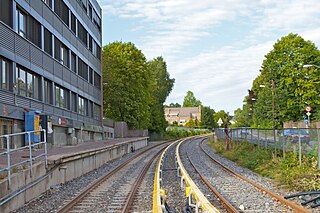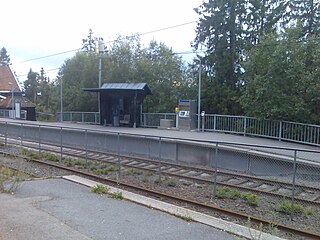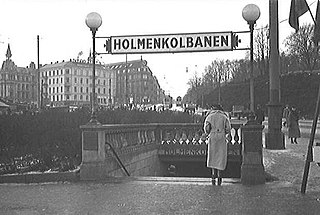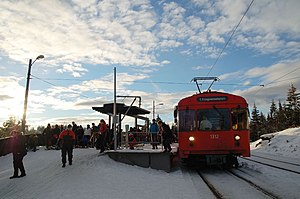
Holmenkollbakken is a large ski jumping hill located at Holmenkollen in Oslo, Norway. It has a hill size of HS134, a construction point of K-120, and a capacity for 70,000 spectators. Holmenkollen has hosted the Holmenkollen Ski Festival since 1892, which since 1980 have been part of the FIS Ski Jumping World Cup and 1983 the FIS Nordic Combined World Cup. It has also hosted the 1952 Winter Olympics and the FIS Nordic World Ski Championships in 1930, 1966, 1982 and 2011.

Holmenkollen is a mountain and a neighbourhood in the Vestre Aker borough of Oslo, Norway. It goes up to 500 metres (1,600 ft) above sea level and is well known for its international skiing competitions.

The Holmenkollen Line is an 11.4-kilometre-long (7.1 mi) Oslo Metro line which runs between Majorstuen and Nordmarka in Oslo, Norway. Operating as Metro Line 1, it is the route with the fewest passengers and the only one still to have level crossings and short station platforms. The line runs mostly through residential areas of detached houses, and the upper parts of the line principally serve the recreational area of Nordmarka. Holmenkollen Station is located close to Holmenkollen National Arena which hosts international Nordic skiing tournaments. Voksenkollen Station is not far from Oslo Vinterpark (Winter) and the Oslo Sommerpark (Summer).

Frøen is a rapid transit station of the Oslo Metro's Holmenkollen Line and previously also the Sognsvann Line. It is situated Frøen neighborhood of the Oslo, Norway, borough of Vestre Aker. Located 3.2 kilometers (2.0 mi) from Stortinget, the station is served by Line 1 of the metro every fifteen minutes. Travel time to Stortinget is six minutes. Diakonhjemmet Hospital falls within the station's catchment area.

The Lambertseter Line is a 5.9-kilometer (3.7 mi) line on the Oslo Metro which runs from Brynseng to Bergkrystallen. It further shares track with the Østensjø Line along the 2.5-kilometer (1.6 mi) section from Tøyen to Brynseng. The line runs through a primary residential area of Nordstrand, serving neighborhoods such as Manglerud, Ryen and Lambertseter. The line is served by Line 4 of the metro, which runs every fifteen minutes. This is supplemented by Line 1 that is extended to Bergkrystallen between 6:30 and 19 on weekdays, giving a combined frequency of eight trains per hour.

Korketrekkeren is a tobogganing track and former bobsleigh and luge track in Oslo, Norway. The tobogganing track runs between Frognerseteren and Midtstuen and is operated as a public venue by the municipality. Return transport to the top of the hill is undertaken by riding the Oslo Metro's Holmenkollen Line. Tobogganing in the area started in the 1880s, with several roads being used during winter evenings. Auto racing took place in the hill in 1921 and the following year it saw its first luge tournament. The first major tournament was the FIL European Luge Championships 1937. Tobagganing also took place in the nearby Heftyebakken, but from 1950 Korketrekkeren became the sole tobogganing hill and Heftyebakken was used for cross-country skiing.

Holmenkollen is a station on the Holmenkollen Line on the Oslo Metro, located in the Holmenkollen area, between Besserud and Voksenlia. Until 1916 when Holmenkollbanen was completed, the terminus station was Besserud and was called Holmenkollen. The station is at an elevation of 277.7 meters (911 ft) above mean sea level. The station architect was Erik Glosimodt.

Ris is a rapid transit station of the Oslo Metro's Holmenkollen Line. It is situated in the Ris neighborhood of the Oslo, Norway, borough of Vestre Aker. Located 5.2 kilometers (3.2 mi) from Stortinget, the station is served by Line 1 of the metro every fifteen minutes. Travel time to Stortinget is 11 minutes. The station opened on 31 May 1898. A shed was moved to the station in 1916. There are proposals to extend the platforms.

Gaustad is a rapid transit station of the Oslo Metro's Holmenkollen Line. It is situated Gaustad neighborhood of the Oslo, Norway, borough of Vestre Aker. Located 4.7 kilometers (2.9 mi) from Stortinget, the station is served by Line 1 of the metro every fifteen minutes. Travel time to Stortinget is ten minutes. The National Hospital and several research institutes fall within the station's catchment area.

Besserud is a station on the Holmenkollen Line on the Oslo Metro, between Midtstuen and Holmenkollen.

Voksenkollen is a station on the Holmenkollen Line of the Oslo Metro. It is the penultimate station on the line, between Lillevann and Frognerseteren. It is also the second highest station on the network, 460 meters (1,510 ft) above mean sea level. The station was opened on 16 May 1916 when the line was extended from Besserud to Frognerseteren.

Lillevann is a station on the Holmenkollen Line on the Oslo Metro. The station is located between Skogen and Voksenkollen, at an altitude of 425 m (1,394 ft) above mean sea level. The station was opened on 16 May 1916 with the extension of the line from Besserud, but the station building is older. That building was built in 1898 on an estate at Besserud, but then moved to Lillevann. The architect was Paul Due.

Skogen is a station on the Holmenkollen Line located between Voksenlia and Lillevann, in Oslo, Norway. The station is at an altitude of 378 meters (1,240 ft) above mean sea level. The station was opened on 16 May 1916 with the extension of the line from Besserud to Frognerseteren. The architect for the station was Erik Glosimodt.

Steinerud is a rapid transit station of the Oslo Metro's Holmenkollen Line. It is situated in the Steinerud neighborhood of the Oslo, Norway, borough of Vestre Aker. Located 3.8 kilometers (2.4 mi) from Stortinget, the station is served by Line 1 of the metro every fifteen minutes. Travel time to Stortinget is seven minutes. Diakonhjemmet Hospital falls within the station's catchment area.

Vinderen is a rapid transit station of the Oslo Metro's Holmenkollen Line. It is situated Vinderen neighborhood of the Oslo, Norway, borough of Vestre Aker. Located 4.2 kilometers (2.6 mi) from Stortinget, the station is served by Line 1 of the metro every fifteen minutes. Travel time to Stortinget is nine minutes. Vinderen is neighborhood center and mostly a residential area. The platforms are located on each side of a level crossing.

Slemdal is a station on the Holmenkollen Line of the Oslo Metro. It is served by Line 1 from Frognerseteren to Helsfyr/Bergkrystallen. It was opened on 31 May, 1898 as a tram station on the Holmenkoll Line from Majorstuen to Besserud

A/S Holmenkolbanen was a company that owned and operated part of the Oslo Tramway and Oslo Metro in Norway from 1898 until 1975 when services were taken over by the majority owner Oslo Sporveier. Holmenkolbanen opened the Holmenkoll Line in 1898, and expanded it to become the first Nordic underground railway in 1928. The company took over operations of the Smestad Line in 1933, the Sognsvann Line in 1934. The company was merged into Oslo Sporveier in 1992.
Tryvandshøiden was a planned station on the Holmenkollen Line in Oslo, Norway. It was planned by the company Tryvandsbanen in the early 1910s and partly constructed in 1916 at the end of a single-tracked line from Frognerseteren. A red signalman's house named "Norden" was the station's only facility. Passenger trains never served the station, and the tracks from Frognerseteren to Tryvandshøiden were removed in 1939. The signalman's house was not demolished. In 1993, 2004 and 2008, proposals were made to re-open the station so that it would be more convenient for Oslo residents to use the Tryvann Ski Resort. However, these proposals were all rejected by the operator Oslo Sporveier on the grounds that the extension would be too expensive.

Frognerseteren is a neighborhood of Oslo, Norway, located within Nordmarka. It is a popular starting point for recreational hiking and skiing in Oslo. Frognerseteren Station is the terminal station of the Holmenkollen Line of the Oslo Metro. Frognerseteren Restaurant and conference facilities is one of the best examples of architectural style Dragestil in Oslo.

Holmenkollen National Arena is a Nordic skiing, ski jumping and biathlon venue located at Holmenkollen in Oslo, Norway. It consists of the large ski jumping hill Holmenkollbakken, the normal hill Midtstubakken and a stadium for cross-country skiing and a shooting range for biathlon. Since 1892, it has hosted the annual Holmenkollen Ski Festival, which is part of the world cup tournaments in ski jumping, cross-country skiing, Nordic combined, as well as annual Biathlon World Cup races. It has previously hosted the 1952 Winter Olympics, and the FIS Nordic World Ski Championships in 1930, 1966, 1982 and 2011.



















